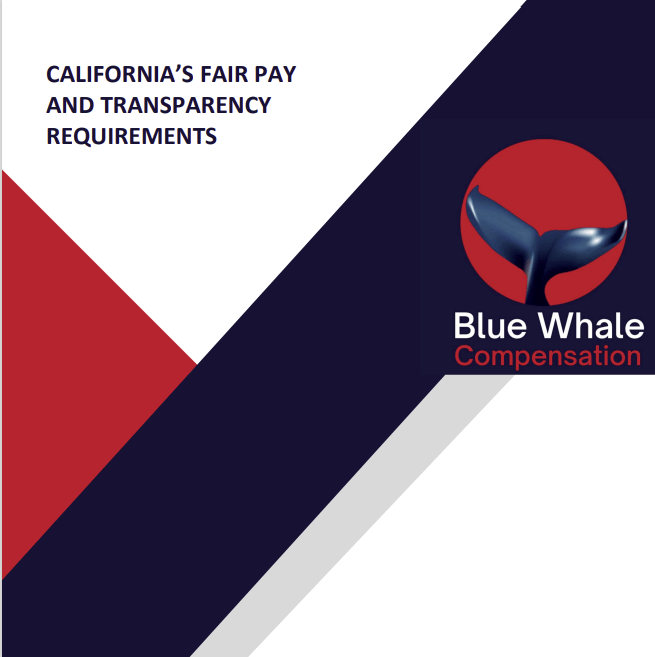Pay Transparency Requirements in WA and CA
Resources to Comply with California and Washington Pay Transparency Requirements
Starting January 1st, 2023, CA and WA employers must comply with a series of measures designed to address pay comparability in the workplace. Blue Whale has prepared the following articles and guidelines to help employers better understand their obligations. For additional support, contact us today for a free, 30-minute consultation.

ACCESS: Blue Whale’s Guide for CA Employers
Our 2022 guide contains tips, regulations, and the latest information on Pay Transparency and the Fair Pay Act.
Covered Topics:
- Fair Pay Act – Background
- Proving Unfair Pay; Justification for Pay Gap Differences
- Pay Transparency For Pay Equity Act, Senate Bill 1162
- Posting Requirements
- Data Reporting
- Employer Resources
- and more . . .
ACCESS: Washington Guide for Employers
Guide on the latest information on Pay Transparency Job Posting Requirements, WA
Covered Topics:
- Employee Job Applicant Rights
- Equal Pay, Definition and Guidelines
- Career Advancement Opportunities
- Open Wage Discussions
- Pay Transparency Requirements
- Employer Resources
- and more . . .

CA Pay Transparency 2023 Legislation: The First 30 Days
After reviewing the first 30 days since 2023 pay transparency laws have gone into effect for California, Washington, and Rhode Island, we have put together an article to provide an overview of requirements for new pay transparency legislation and key findings for how companies have been interpreting and adapting to this legislation in the new year.
CA Transparency Requirements – Senate Bill 1162
Beginning on January 1st, 2023, if your organization has 15 or more employees, you must include the salary range within your job postings and provide the pay scale to your current employees upon request. In addition, your organization must record your employees’ job titles and wage history during employment and for three years post-termination.
Beginning on May 10th, 2023, if your organization has 100 or more employees, you will be required to report to the Civil Rights Department annually the median and mean hourly rate for each of your organization’s job categories broken down by race, ethnicity, and sex.
Penalties

Your organization must comply with California’s Pay Transparency Requirements or risk civil penalties of up to $10,000 per violation. *No penalty will apply for a first violation of the job posting requirement if your organization can show that all job postings for open positions have been updated to include the pay scale.
Your organization will face up to a $100 fine per employee if your organization fails to file the required reports. For subsequent failures, your organization may face a civil penalty of up to $200 per employee.
Reporting Requirements, California
Blue Whale Compensation can help your organization update its compensation structure and policy to manage compliance obligations. In addition, we can help organizations with SB 1162’s reporting requirements.

Contact us today to schedule a free, 30-minute consultation.
Need a plan that satisfies Pay Transparency Requirements? Check Blue Whale’s Integrated Comp

Blue Whale’s Integrated Comp Plan includes the tools to best manage pay equity and compliance obligations under SB 1162 and SB 358, and Washinton’s new pay transparency requirements. It includes training, policy manuals, and implementation support. We recommend this to who are subject to Fair Pay and Transparency Requirements and to companies who wish to embrace their social responsibility towards equitable pay.
Want to learn more about our services? Let’s start the conversation

